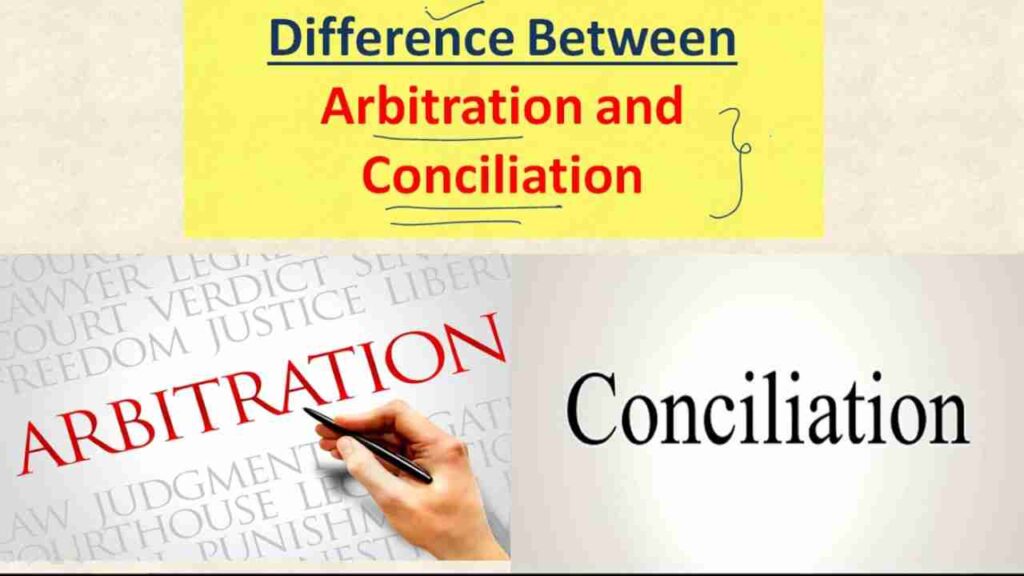
Explore Key 15 Difference between Arbitration and Conciliation
Arbitration and conciliation are two distinct methods of dispute resolution that serve as alternatives to the traditional court system. While both aim to reach a resolution, they differ in their approach and key characteristics. Here are 15 difference between arbitration and conciliation in a simpler way for your upcoming exams:
15 Difference between arbitration and conciliation
Nature: Arbitration is an adversarial process in which a neutral third party, known as an arbitrator, renders a binding judgement. Conciliation, on the other hand, is a non-binding procedure where a third party aids the parties in communication and aids them in reaching a peaceful resolution.
Decision-Making Authority: In an arbitration, the arbitrator has the authority to render a final and binding judgement in the case. Due to the conciliator’s lack of decision-making authority, the parties in conciliation must reach an agreement.
Legal Formality: Arbitration is a more formal proceeding that is frequently governed by particular laws and rules, and the arbitrator’s decision in such a proceeding may be enforced by the court. Conciliation is less formal and the parties have more control over the process and outcomes.
Arbitration may be required by the contract or agreed to by the parties, or it may be optional. Conciliation is typically a voluntary process that requires consent from both parties.
The neutral party’s role in arbitration is to act as a judge, weighing the arguments, hearing the evidence, and coming to a conclusion. In conciliation, the conciliator performs the role of a mediator, assisting the parties in communication, option consideration, and the formulation of resolution suggestions.
Binding The arbitrator’s decision is final, judicially enforceable, and obligates all parties. Because the outcome of the conciliation is not legally binding, the parties are free to accept or reject the suggested resolution.
Confidentiality: The confidentiality of arbitration proceedings generally protects the privacy of the parties involved. Another essential element of conciliation is confidentiality, which promotes an environment that is open to discussion and negotiation.
Speed: Arbitration proceedings typically last longer due to their formal format and need to present evidence. Because conciliation is less formal, it frequently results in a quicker resolution.
Arbitration can be more expensive due to the potential need for legal counsel, formal procedures, and the arbitrator’s fees. Conciliation is typically less expensive because there are fewer formalities and legal requirements.
Expertise: Arbitrators are frequently selected based on their familiarity with the topic of the dispute, ensuring that the decision-maker has access to relevant data. The conciliator’s negotiation and communication skills are more crucial in conciliation than their familiarity with the subject matter.
Finality: The arbitration award is typically conclusive and can only occasionally be contested. The outcome of the conciliation is not legally binding, so the parties may continue their discussions or seek other means of resolving the issue.
Relationship Preservation: Because arbitration is adversarial, there is a risk that the parties’ relationship will deteriorate. By promoting open communication and cooperation, conciliation aims to preserve or mend the relationship.
Only certain grounds, such as unfair arbitrators or irregularities in the arbitration process, may be used to challenge arbitration awards. There is typically no room for disagreement because the decision reached during conciliation is not legally binding.
Legal representation is available; however, arbitration proceedings frequently involve legal representation due to formalities and statutory requirements. Parties may take part in conciliation without legal representation if they so choose.
Control over the Process: The parties have less control over the arbitration process because it is more regulated and structured. Conciliation gives the parties more power by granting them more control over the procedure and the ability to customise it to meet their unique needs.
Understanding the difference between arbitration and conciliation can help parties choose the most appropriate method of dispute resolution by taking into account factors like the nature of the dispute, the desired resolution, cost considerations, and the maintenance of the relationship between the parties.
Also Read: Explore Key 15 Difference between Biogas and Natural gas